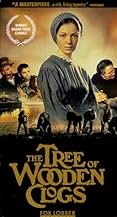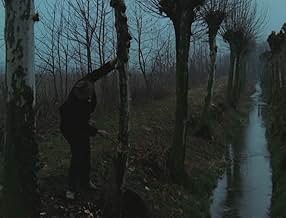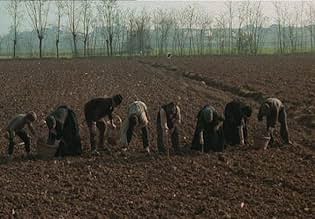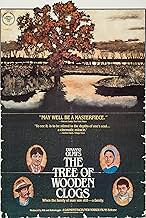- Won 1 BAFTA Award
- 18 wins & 1 nomination total
- Director
- Writer
- All cast & crew
- Production, box office & more at IMDbPro
Featured reviews
I had seen Wooden Clogs about twenty years ago but could remember very little about the film other than it was about very poor Italian peasant farmers at the turn of the century and that 'wooden clogs' somehow figured into the film's plot.
It is one of those films that is seemingly about nothing, but could be about everything. i didn't find its 3 hour length to be a problem. It is almost like watching a documentary about peasant life right down to its hand held camera techniques. It is subtle though. Not the shaky-cam or vomit-cam stuff you see today.
The cast is entirely made up of non-actors. Real peasants. And apparently it was shot using its local dialect, Bergamasque which then had to be dubbed into Italian for the Italian market. Olmi explains in the DVD extras that all of the non-actors did their own dubbing which I have to say is quite a technical accomplishment for amateurs.
The film opens with a farmer chopping the head off of a goose. A little later on the controversial scene depicting the slaughter and butchering of a hog is played out in almost real time. It is very graphic and quite disturbing. But just when I thought you would never want your kids to see this, Olmi cuts to two three year-old peasant kids watching the hog die with unbothered fascination. This is real life on a real farm.
And you can tell that it is done by a proficient butcher and is not a gratuitous add-on for exploitation. It is just something that Olmi has selected to include in the film.
I'd suggest this one for a change of pace.
It is one of those films that is seemingly about nothing, but could be about everything. i didn't find its 3 hour length to be a problem. It is almost like watching a documentary about peasant life right down to its hand held camera techniques. It is subtle though. Not the shaky-cam or vomit-cam stuff you see today.
The cast is entirely made up of non-actors. Real peasants. And apparently it was shot using its local dialect, Bergamasque which then had to be dubbed into Italian for the Italian market. Olmi explains in the DVD extras that all of the non-actors did their own dubbing which I have to say is quite a technical accomplishment for amateurs.
The film opens with a farmer chopping the head off of a goose. A little later on the controversial scene depicting the slaughter and butchering of a hog is played out in almost real time. It is very graphic and quite disturbing. But just when I thought you would never want your kids to see this, Olmi cuts to two three year-old peasant kids watching the hog die with unbothered fascination. This is real life on a real farm.
And you can tell that it is done by a proficient butcher and is not a gratuitous add-on for exploitation. It is just something that Olmi has selected to include in the film.
I'd suggest this one for a change of pace.
I have a bit of warning for the tender-hearted. This is a realistic portrait of peasant life and as such you'll see a couple animals butchered on-screen. A pig and goose are killed and some might find this pretty disturbing...but it is realistic and is an important part of peasant life.
This film is sort of a more modern Neo-realist sort of film because like the Neo-realist films of the 1940s and early 1950s, it is an Italian film that consists of non-professional actors in natural settings. However, the reason why this was done is quite different. During the time of WWII and post-war Italy, sets and actors were hard to come by and directors (such as De Sica and Rossellini) had no choice but to make these sorts of films. However, in 1978 the film was made this way for entirely different reasons--to heighten the sense of realism as the film was about simple folks and having professionals playing these roles might have detracted from this realism.
The film is set on a farming collective owned by a landlord. Five families work the land and share a large compound broken down into separate apartments and stables. The life is pretty simple and rather grim and the film does a very good job of portraying this life. And this is much of the problem with this film for the average viewer. While history teachers like me might find it all pretty fascinating and like how accurately this is all portrayed, will the average viewer? Probably not. That's because not all that actually happens in the film---and it lasts about three hours. As a result, the film does drag and I even found myself feeling sleepy as I watched. It's exceptionally well crafted but also a bit of a chore to view.
"Tree of Wooden Clogs" is a film that film critics will adore but the average person will probably hate...and many folks will feel guilty because they didn't 'get' the movie and think they should have.
This film is sort of a more modern Neo-realist sort of film because like the Neo-realist films of the 1940s and early 1950s, it is an Italian film that consists of non-professional actors in natural settings. However, the reason why this was done is quite different. During the time of WWII and post-war Italy, sets and actors were hard to come by and directors (such as De Sica and Rossellini) had no choice but to make these sorts of films. However, in 1978 the film was made this way for entirely different reasons--to heighten the sense of realism as the film was about simple folks and having professionals playing these roles might have detracted from this realism.
The film is set on a farming collective owned by a landlord. Five families work the land and share a large compound broken down into separate apartments and stables. The life is pretty simple and rather grim and the film does a very good job of portraying this life. And this is much of the problem with this film for the average viewer. While history teachers like me might find it all pretty fascinating and like how accurately this is all portrayed, will the average viewer? Probably not. That's because not all that actually happens in the film---and it lasts about three hours. As a result, the film does drag and I even found myself feeling sleepy as I watched. It's exceptionally well crafted but also a bit of a chore to view.
"Tree of Wooden Clogs" is a film that film critics will adore but the average person will probably hate...and many folks will feel guilty because they didn't 'get' the movie and think they should have.
This is a really beautiful film. I am neither Italian, nor Catholic (nor even religious at all in the usual sense) but found this to be wonderful and involving. (I know Italy, and love it, though.) Taking place in around the turn of the previous century, the simple life of farming tenants on a lord's estate is portrayed with great charm and simple respect. You get a fascinating look at what to us now of course seems a backward combination of ancient religious myths and medieval magic, all believed in the hope of a better life in what is a difficult existence. Yet there is a hint of the modern world to come in the distant shouts and arrests of political activists glimpsed to the side, who are advocating a more fair economy, and less dependence on outmoded beliefs. The warm and dignified life of the loving families is quite believable, and no need to judge the comforts they cling to. In terms of length an pacing, it takes its time, it is true, but it is really worth it. A sort of living demonstration of the enduring human spirit, and the passing of time and history---even as old ways are dimly remembered and treasured for their sentiment.
10Jean-7
Very rarely, films transcend their medium and break through into some other dimension. These are not merely technically superb films with fine cinematography and wonderful performances. Rather, something else has been addressed; at the risk of seeming pompous, I'd call it "what it means to be human." Maybe some of you know what I'm talking about. After the film is over, you walk out into the world and your life has changed in some fundamental way. You actually experience colors and shapes and smells afresh, as though you've re-emerged into a different universe.
I can think of several films that have had that effect on me. Eric Rohmer's "Summer (Le Rayon Vert)" and Kieslowski's "Decalogue" spring to mind. But "Tree of Wooden Clogs" approached the core. I'm not Catholic, would pronounce myself an atheist if that didn't suggest the arrogance of certainty, but this movie comes as close to touching the soul as any I've ever seen. It is one of the most shattering, delightful, and profound works of art ever created. After first seeing it, I sat in my car, clutched the steering wheel, and sobbed for half an hour.
Since that day, many years ago, moments from it continue to haunt me. I'll be walking down a street lined with trees and remember the boy walking home from school. Out of the blue, the looks on the faces of the just-married young couple as they adopt a child will come to me. And, of course, the image of the villagers watching the lone wagon disappear into the darkness is one which will live with me until I die.
In short, as I stumble my own way through life, this film is one of the touchstones that reminds me why I'm here.
I can think of several films that have had that effect on me. Eric Rohmer's "Summer (Le Rayon Vert)" and Kieslowski's "Decalogue" spring to mind. But "Tree of Wooden Clogs" approached the core. I'm not Catholic, would pronounce myself an atheist if that didn't suggest the arrogance of certainty, but this movie comes as close to touching the soul as any I've ever seen. It is one of the most shattering, delightful, and profound works of art ever created. After first seeing it, I sat in my car, clutched the steering wheel, and sobbed for half an hour.
Since that day, many years ago, moments from it continue to haunt me. I'll be walking down a street lined with trees and remember the boy walking home from school. Out of the blue, the looks on the faces of the just-married young couple as they adopt a child will come to me. And, of course, the image of the villagers watching the lone wagon disappear into the darkness is one which will live with me until I die.
In short, as I stumble my own way through life, this film is one of the touchstones that reminds me why I'm here.
10Rigor
This film really surprises. It is long and detailed, yet, it is amazingly suspenseful. The quiet sturdy look at rural life in Italy manages to accomplish the amazing feet of truly "being" a film of "the oppressed" rather than a mere analysis of "the wretched of the earth". Olmi's direction of the non-professional cast is superb and the film is beautifully shot and edited.
Don't be afraid of this film. It does not actually seem long, nor does it seem aimless or plotless. While one may say that "the whole pesant community" is the real protagonist there are clearly defined characters in the film whose narratives we follow. In fact, the films strategy is one of integration of these narrative strands in a seemingly coherent and logical way. A wonderful, very emotionally moving experience with a clear, sharp, political analysis.
Don't be afraid of this film. It does not actually seem long, nor does it seem aimless or plotless. While one may say that "the whole pesant community" is the real protagonist there are clearly defined characters in the film whose narratives we follow. In fact, the films strategy is one of integration of these narrative strands in a seemingly coherent and logical way. A wonderful, very emotionally moving experience with a clear, sharp, political analysis.
Did you know
- TriviaAll the actors were real peasants from the Bergamo province, in Italy. They had no acting experience at all.
- GoofsWhen the children are making music with pots and pans, the 'instruments' of the little girl are switching from one hand to the other when the camera looks at her from the other side.
- Quotes
[first lines]
Don Carlo: That boy should be going to school.
Batistì: Yes but six kilometers to school and six kilometers back seems a lot.
Don Carlo: He's young, he has strong legs.
Batistì: Just when we're about to have another baby. He could have started helping me around the house.
Don Carlo: He'll help you even more when he's older. Let providence provide for now.
Batistì: I grew up without ever seeing the inside of a school.
Don Carlo: That's not a good reason, and you know it. If God has given your boy a good mind, it's a sign he's expecting more of him. As the boy's father, it's your duty to do God's bidding.
- Crazy creditsQuite strangely, the names of the actors are listed as "last name first name", while the names of the rest of the crew are correctly listed as "first name last name".
- Alternate versionsThere are two versions of this movie: one which is spoken in the dialect of Bergamo, Italy, and one in which the actors dubbed themselves in Italian.
- ConnectionsEdited into Bellissimo: Immagini del cinema italiano (1985)
- SoundtracksIch steh' mit einem Fuß im Grabe BWV, 156
Composed by Johann Sebastian Bach
Performed by Fernando Germani
- How long is The Tree of Wooden Clogs?Powered by Alexa
Details
Box office
- Gross worldwide
- $9,367
- Runtime
- 3h 6m(186 min)
- Sound mix
- Aspect ratio
- 1.33 : 1
Contribute to this page
Suggest an edit or add missing content





















